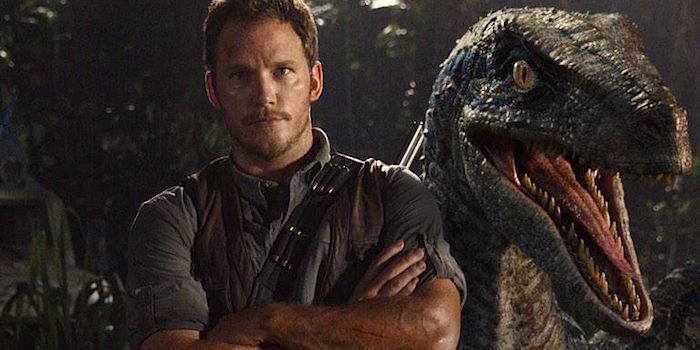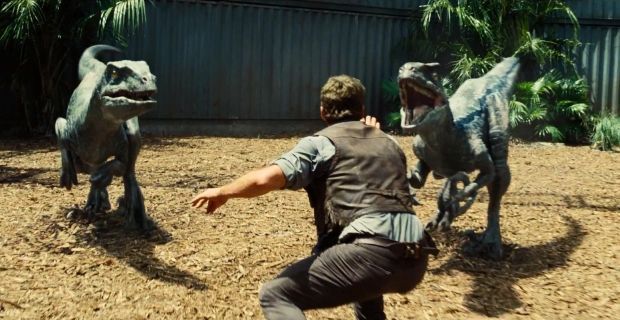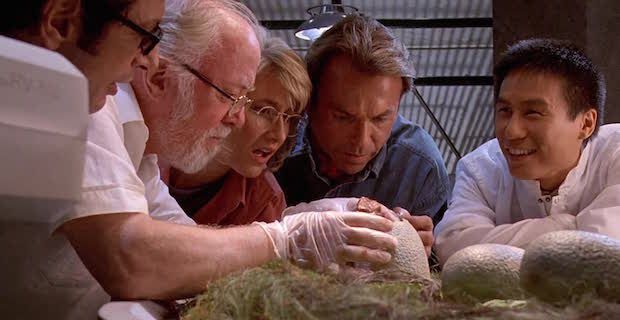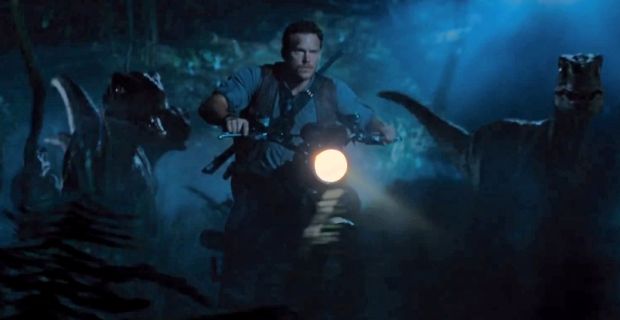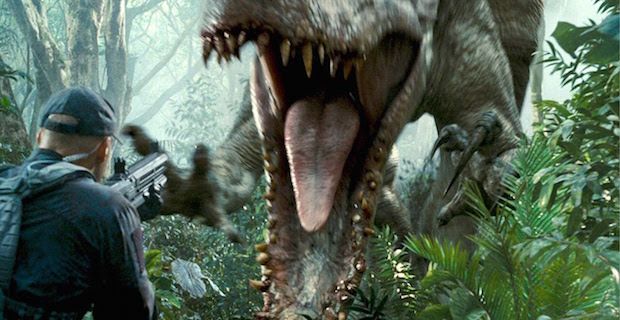[UPDATE: Jurassic World is now playing - and our explanation was on point!]
Twenty-two years after the release of Jurassic Park, Universal Studios has relaunched the fan-favorite series with Jurassic World - a fresh installment that point the franchise on a new trajectory going forward. With only minor characters from the previous trilogy returning, most notably Jurassic Park's Chief Geneticist, Dr. Henry Wu (B.D. Wong), director Colin Trevorrow has assembled a fresh-faced human cast, including Chris Pratt (Guardians of the Galaxy), Bryce Dallas Howard (The Help), and Vincent D'Onofrio (Daredevil), to face off against the biological preserve's prehistoric inhabitants.
Yet, in order to differentiate Jurassic World from the films that came before it, Trevorrow's addition to the series features a fully operational park - a victory of scientific ingenuity (that has been entertaining visitors for ten years without incident). However, when attendance rates begin to decline, Jurassic Park's scientists once against become too preoccupied with whether or not they could, they never stop to think if they should, creating a new hybrid dinosaur attraction. Following in the enormous footsteps of prior dino-stars, (the Tyrannosaurs Rex and Spinosaurus), the genetically modified creation Indominus Rex ushers in a bold new twist on the series.
However, a hybrid dinosaur wasn't the most controversial plot point in the Jurassic World trailers - as Chris Pratt's "trained" velociraptor squad became a divisive point among fans who thought the idea of domesticated raptors was either an interesting development or a completely asinine misstep.
On the a recent Screen Rant Underground podcast, we discussed why the plot point could be cool - as well as possible explanations for how Chris Pratt's character, Jurassic World game warden Owen, managed to gain control over Jurassic Park's most deadly (and defiant) species.
As a result, we've put together four theories that explain the velociraptors' change from malevolent and blood-thirsty killers to semi-obedient partners in dino-rampage damage control. Our discussion is going to contain mild SPOILERS for Jurassic World, so READ NO FURTHER unless you’re all caught up. You have been warned.
-
Owen is the Raptor Pack's Alpha Male
Plenty of fans have scoffed at the aforementioned trailer scene of Chris Pratt driving a motorcycle, flanked by raptors, through the jungle. Most skeptics either think the scene is ridiculous (at a fundamental level) or simply believe that "domesticated" raptors defeat the entire appeal (and terror) of the iconic Jurassic Park dinos. However, Pratt didn't outright "domesticate" or "tame" the raptors and has, instead, established himself as the ferocious animals' alpha. Previous Jurassic Park storylines have presented the raptors as lion-like pack hunters - led by an alpha that, if necessary, even kills potential challengers within the pride to secure a leadership position.
The relationship was clearly laid-out by former Jurassic Park game warden, Robert Muldoon (Bob Peck) in the original film:
Jurassic World's raptors aren't the first animals to accept a human being as their pack leader. Plenty of scientists have lived in animal communities, establishing roles as leaders within a group of wild (and downright dangerous) creatures.
Speaking on the subject, Trevorrow had previously provided hints at a similar relationship between Owen and the raptors:
“Owen’s relationship with the raptors is complicated. They aren’t friends. These animals are nasty and dangerous and they’ll bite your head off if you make the wrong move. But there are men and women out there today who have forged tenuous connections with dangerous predators. That’s interesting territory to me.”
Muldoon's big game hunter background played a significant part in how he viewed the dinosaurs on the island - especially the raptors. As seen the in clip above, Muldoon believed the raptors should "all be destroyed." Jurassic World's Owen believes that, conversely, the only way to control the raptors is to build a relationship of trust - standing up to the bigger and more aggressive raptors (as seen in a brief Super Bowl trailer shot) until the entire group begrudgingly recognizes him as the top dog.
Some might find little difference between this scenario and "domesticating" the raptors; however, instead of placating the vicious dinosaurs and teaching them crowd-pleasing tricks (read: the Mosasaur aquarium), becoming a pack leader afforded Owen control over the group without undercutting the animals' inherent ferocity, potential for betrayal, and big screen appeal.
-
The Raptors Imprinted on Owen at Birth
In addition to the alpha role presented above, Owen also oversaw the hatching of each "trained" raptor. In the original Jurassic Park, John Hammond indicated that he was present at the birth of every single dinosaur on the island - which, allegedly, helped the animals trust him. It's a story thread that was never really payed-off - as Hammond was still scared of any "meatasauruses" running loose in Jurassic Park.
That said, just because we don't see Hammond halt a T-Rex attack via his parental connection, there are plenty of animal species that do imprint at birth - creating a bond that, with continual interaction, grows stronger overtime. As a result, since Owen was present at the initial hatching of each raptor, it stands to reason that even the wildest velociraptor could, potentially, mind the Jurassic World game warden, allowing him to tame their predatory impulses or, at the very least, command them to follow his instructions in certain situations.
Assuming Hammond and Dr. Wu were correct in saying that dinosaurs imprint at the time of their hatching, and that the imprinting raises the amount of trust they have for an individual, it makes sense that Owen is uniquely positioned to work with/command the dinos - even if they aren't outright "tamed."
-
NEXT PAGE: Did Dr. Wu Toy with Velociraptor Genes Too?
Dr. Wu May Have Toyed with Velociraptor Genes
Considering that Masrani Global (the new owners of Isla Nublar) toyed with dino DNA to create an entirely new (hybrid) creature, it stands to reason that the company's scientists could also have altered certain aspects of the velociraptor genome. After all, even in the early days of dinosaur cloning, InGen was making calculated alterations to their creations: denying embryos the possibility of a Y chromosome (to ensure all the animals were female) as well as engineering the dinosaurs with faulty genes that prevent production of the amino acid lysine (in case they ever got off the island).
According to that film, it was Dr. Wu that made the lysine contingency possible - and, since Wu is back for Jurassic World, it wouldn't be particularly surprising if the geneticist made adjustments to the park's most dangerous dinosaurs (once again). While it's not explicitly stated in the film, it's possible that Wu and Masrani engineered their new raptors to be slightly more docile and obedient - Wu even hints at this idea in his argument with Masrani, stating that none of the dinosaurs on the island are entirely authentic to their original species, and have been altered in subtle ways to make better park attractions. While the notion of nerfed velociraptors would be upsetting to series fans (and somewhat undercut the importance of Owen's relationship with the dinos), there's a precedent for the idea as far back as Michael Crichton's original story.
Check out the full conversation between John Hammond and Dr. Henry Wu from Crichton's Jurassic Park novel (via Reddit and /Film):
“The dinosaurs we have now are real,” Wu said, pointing to the screens around the room, “but in certain ways they are unsatisfactory. Unconvincing. I could make them better.”
“Better in what way?”
“For one thing, they move too fast,” Henry Wu said. “People aren’t accustomed to seeing large animals that are so quick. I’m afraid visitors will think the dinosaurs look speeded up, like film running too fast.”
“But, Henry, these are real dinosaurs. You said so yourself.”
“I know,” Wu said. “But we could easily breed slower, more domesticated dinosaurs.”
“Domesticated dinosaurs?” Hammond snorted. “Nobody wants domesticated dinosaurs, Henry. They want the real thing.”
“But that’s my point,” Wu said. “I don’t think they do. They want to see their expectation, which is quite different…. I’m just saying, why stop there? Why not push ahead to make exactly the kind of dinosaur that we’d like to see? One that is more acceptable to visitors, and one that is easier for us to handle? A slower, more docile version for our park?”
Hammond frowned. “But then the dinosaurs wouldn’t be real.”
“But they’re not real now,” Wu said.
Following the destruction of Jurassic Park, it makes complete sense that Masrani would be interested in taking added precautions - especially with the park's most dangerous inhabitants. What if Wu and Masrani executives both felt that raptors, in their natural form, were a liability and too hard to handle - leading to genetic modification that made the animals "more docile" and "acceptable to visitors"?
Obviously, Trevorrow doesn't turn the fan-favorite velociraptors into entirely docile shells of their former onscreen selves but it's not too much of a stretch, especially considering the series' ongoing thematic emphasis on humankind manipulating nature, that Dr. Wu could have done some minor tinkering with raptor genes/hormones in order to make them a bit more agreeable. After all, Jurassic World appears to be tightly controlled theme park - one that has learned from the mistakes of InGen's past, maybe that security came at a cost: significant genetic tampering.
-
The Enemy of My Enemy is My Friend
Ultimately, by the final act of the film, the situation is less black and white for the raptors - when they are torn between their former alpha (Owen) and a dangerous new contender for the title (one that shares raptor DNA). Ultimately, whether the raptors side with Owen to take on Indominus rex because of loyalty or self-preservation isn't entirely clear (it's probably a bit of both). However, there's no doubt that Jurassic World's velociraptors have determined Indominus rex is a greater immediate threat than their human captors - since the sizable hybrid is on a blood-soaked rampage (simply for the sake of sport and fun).
Taking into account raptor intellect, it's conceivable that the ruthless predators would want to eliminate any significant competitor that would threaten their safety (and future food sources) on the island. After all, this wouldn't be the first time that the raptors have attempted to takedown an apex predator - simply because it got in the way of their own feeding frenzy.
Still, the aforementioned scene of the raptors actively running alongside Owen's motorcycle in the jungle makes it clear the velociraptors aren't completely free-thinking strategists, and do, even by the end, respect Owen. It's conceivable that the brainy dinos are smart enough to understand they've got a good reason to assist Jurassic World's game warden - even if they are still far from being "tamed".
After all, the raptors of Jurassic Park III proved that the dinos aren't thoughtless killing machines and, depending on the circumstances, have spared humans they encounter - in the interest of more pressing matters (specifically the protection of their eggs).
Given the trust and care that Owen established with Jurassic World's velociraptors, it's not entirely out of left field for them to refrain from killing him, if he served to help protect their pack from annihilation at the hands of Indominus rex.
-
If you have your own theories, or can help fill in the holes in our own (or poke brand new ones), we invite you to share them in the comments!
Update: How it Should Have Ended has offered a fifth (tongue-in-cheek) theory of their own:
NEXT: Jurassic World Indominus Rex Abilities & Origin Explained
-
Jurassic World is now playing in theaters.

